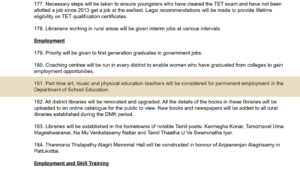Initially, the part-time teachers were paid a monthly honorarium of ₹5,000. Currently, their maximum salary is ₹12,500. Additionally, they do not receive any payment for May, when schools are closed for summer holidays.
Published Jul 16, 2025 | 9:00 AM ⚊ Updated Jul 16, 2025 | 9:00 AM

Part-time teachers protest in Chennai.
Synopsis: In 2012, the then-AIADMK government appointed 16,549 part-time teachers based on a special order passed in the state Assembly under Rule 110. These teachers were assigned to enhance students’ skills in eight subjects: Physical education, computer science, drawing, tailoring, music, and others.
For the past eight days, part-time teachers from across Tamil Nadu have been staging a protest in Chennai, demanding permanent employment in government schools.
These teachers were appointed in 2012 under a special government order issued by then Chief Minister J Jayalalithaa. For the past 13 years, they have been serving in government schools as part-time teachers across various disciplines.
In 2012, the then-AIADMK government appointed 16,549 part-time teachers based on a special order passed in the state Assembly under Rule 110. These teachers were assigned to enhance students’ skills in eight subjects: Physical education, computer science, drawing, tailoring, music, and others.
According to the coordination committee of the part-time teachers’ associations, over 12,000 teachers have been still working as part-time instructors in government schools. Many others have retired from service.
When initially appointed, the recruitment process mirrored that of permanent teachers — including call letters, adherence to reservation policies, interviews, and selection based on merit. However, the teachers claimed that they are nowhere near the status of permanent teachers — not even 10 percent in terms of job security or salary benefits.
These teachers work three half-days per week in government schools and are not entitled to any employment benefits such as Provident Fund (PF), Employee State Insurance (ESI), or health coverage.

DMK’s 2021 election Manifesto.
When appointed in 2012, they were paid a monthly honorarium of ₹5,000. Currently, their maximum salary is only ₹12,500. Additionally, they do not receive any payment for May, when schools are closed for summer holidays.
In essence, they are employed by the government in jobs that lack both basic income security and social protection.
The teachers also alleged that more than 12,000 teaching posts remain vacant in government schools, yet the state continues to rely on temporary contract workers instead of filling the vacancies permanently.
The protesting teachers said that the ruling DMK has repeatedly promised to regularise their employment — during the 2016 Assembly elections, the 2019 Lok Sabha elections, and again in the 2021 Assembly elections.
Specifically, the DMK’s 2021 manifesto has as its 181st promise, “Part-time art, music and physical education teachers will be considered for permanent employment in the Department of School Education.” The teachers are now urging the government to honour this commitment.
Speaking to South First, S. Khader Moideen, a part-time teacher and Salem district secretary of the part-time teachers’ union, said, “In the past four years, we have met the School Education Minister Anbil Mahesh Poyyamozhi and department officials more than 200 times. We have submitted evidence, including data on where vacancies exist and which schools lack subject-specific teachers. Yet, no action has been taken so far.”
He also noted that teachers are now required to use the EMIS (Education Management Information System) software to input student data and education-related activities. But this is not a task all teachers can do easily — it demands additional time. He suggests that such responsibilities be assigned to computer instructors instead.
Similarly, with over 6,000 advanced computer labs recently established in government schools, Moideen proposes to make part-time computer teachers permanent in those labs.
Due to years of unaddressed demands, four different part-time teachers’ unions have now come together under the umbrella of the Part-Time Teachers Association Coordination Committee. Since 7 July, hundreds of part-time teachers from across Tamil Nadu have travelled to Chennai and are staging a continuous protest.
They say they will not leave until their only demand — regularisation of employment — is met.
During a road blockade protest on 14 July, some of the teachers alleged that they were manhandled by police near the School Education Department premises in Nungambakkam, Chennai. The police have also booked more than 200 teachers on charges of unlawful assembly and disturbing public peace.
So far, officials have only assured them that “necessary steps are being taken.” The teachers, however, are resolute in their demand for permanent jobs and said they will not end the protest until this is fulfilled.
(Edited by Majnu Babu).
